


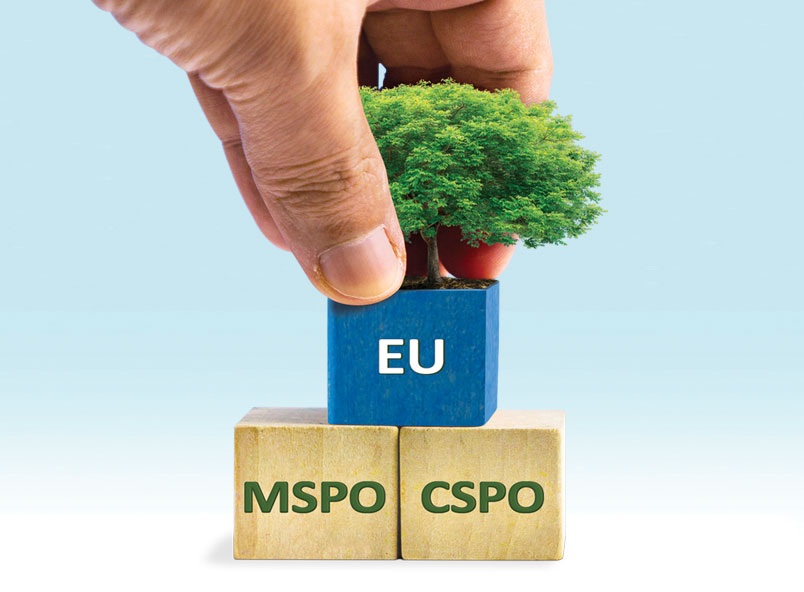
Influential report on palm oil
July, 2021 in Issue 2 - 2021, Cover Story
The Centre for Sustainable Palm Oil Studies (CSPO) has partnered with EU Parliament Magazine to produce a supplement highlighting efforts to promote the use of sustainable palm oil. The supplement, titled ‘Sustainability First: The prospects of sustainable palm oil certification and consumer action to tackle deforestation’, underscores the CSPO’s mission, achievements and ‘Sustainability First’ campaign.
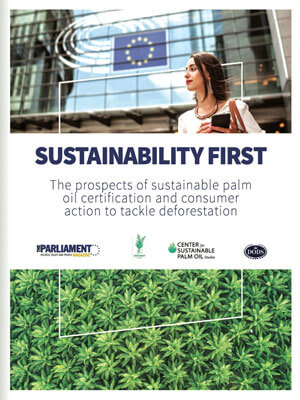
Published in print as well as posted online, the supplement features insights from CSPO board members, researchers and stakeholders. The authors cover a variety of relevant issues pertaining to palm oil, deforestation and sustainability, using the unique opportunity to highlight possible new partnerships on palm oil instead of a ban.
Introducing the supplement, CSPO Advisory Board Chairman Dr Ibrahim Özdemir, a world-renowned ecologist and UNEP consultant, renews calls for Europe to use its Green Deal to work with international partners to confront the threat of climate change and deforestation in order to build a sustainable future.
Özdemir warns that there is often conflict between the EU’s perceptions and the realities of sustainability. The case of palm oil exemplifies this conflict. As a ‘forest-risk commodity’, palm oil is often blamed for deforestation; yet, policy makers ignore the positive developments in supply chain transparency and renewed international collaboration, such as the EU-ASEAN Joint Working Group on Palm Oil.
Malaysia – the world’s second-biggest producer of palm oil – has witnessed a yearly decrease in deforestation since 2016. This milestone is partly attributable to the nationally mandated Malaysian Sustainable Palm Oil (MSPO) certification scheme. Importantly, the success of MSPO can be used as a vital template for harmful forest-risk commodities like soybean or beef.
The ‘Sustainability First’ campaign, which collates palm oil research, expertise and analyses to inspire fact-based conversations pertaining to sustainable palm oil, hopes to enable a new generation of ethical consumers. By breaking misconceptions surrounding palm oil, the accomplishments of the MSPO can leverage the opinions and choices of European consumers. If consumers and the successes of the MSPO are used to influence policy, new sustainable consumption patterns could shape environmental sustainability.
Therefore, the time is now for policy makers to embrace practical global solutions for sustainable consumption, trade and production.
Contextualising deforestation drivers
In providing a broader picture of deforestation, environmental activist and food ethics researcher Isabel Schatzschneider writes about forest-risk commodities. According to a study by non-profit organisation CDP, agriculture and forestry contribute to more than 80% of global deforestation. The leading deforestation drivers, soybean and beef, account for more than two-thirds of forest loss in Latin America and 30% of all carbon emissions.
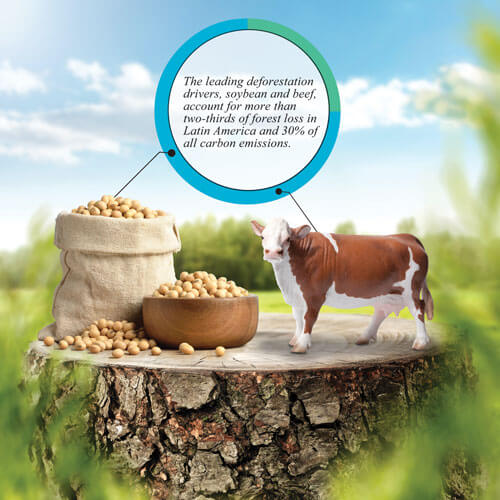
The palm oil industry now faces a 2030 ban for biofuels use in Europe, but the beef and soybean industries encounter little scrutiny, underscoring the hypocrisy in how palm oil is treated by EU policy makers.
While the palm oil industry has made leaps and bounds in addressing deforestation, the beef and soybean industries are failing. They both lack sustainable certification schemes and operate under notoriously opaque supply chains. Consequently, in Brazil, deforestation has reached a 12-year high.
Malaysia designed the MSPO with the EU in mind; and yet, the bloc is ignoring its ability to reduce deforestation, missing a vital opportunity to collaborate with and improve such systems. If the EU is serious about addressing deforestation, it must recognise the progress made in sustainable palm oil production as well as consider the environmental impacts of the other commodities.
Dr Nafeez Ahmed, the executive director of the System Shift Lab and research fellow at the Shumacher Institute for Sustainable Systems, writes that the EU’s de facto ban on palm oil will have unintended and far-reaching consequences.
Nafeez reminds readers that the ban will increase the production of less sustainable biofuels and displace the effects of deforestation. Alternative oilseeds such as soybean, rapeseed, coconut or sunflower all require more land, water and fertiliser. Palm oil, which produces 35% of the world’s vegetable oil supply on less than 10% of the allotted land, is incredibly efficient – all other alternatives would require four to 10 times more land to produce the same amount of oil.
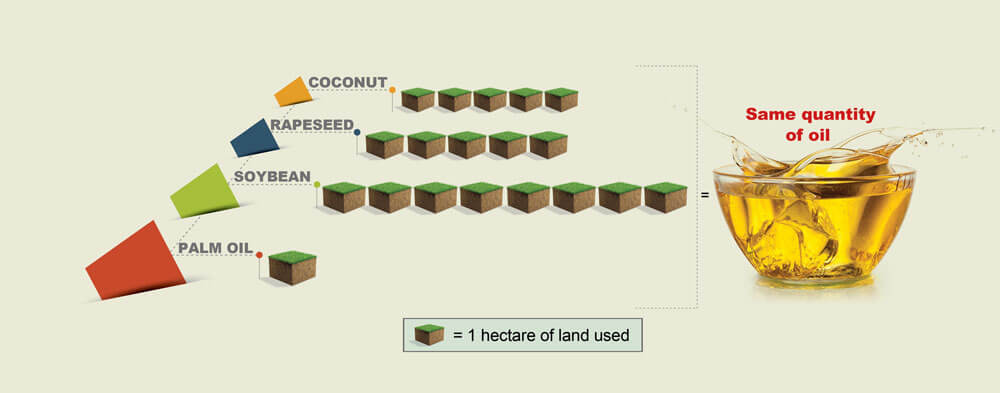
Also, the palm oil ban does not consider how it could reverse all progress. For instance, if the EU ostracises Malaysian Palm Oil, it is effectively telling smallholders that their efforts to produce sustainable palm oil has been for nothing.
Not only would this disincentivise sustainable production, but it could also lead to producers selling palm oil to ready markets with fewer environmental restrictions. For example, both India and China care less about sustainably produced palm oil; therefore, there would be less reason for smallholders to invest in sustainable measures.
Overall, the EU’s palm oil ban does not consider the negative effects of a one-dimensional boycott. More so, it verges on European protectionism as all of its alternatives are domestically cultivated crops. In summary, the EU will contribute to a rise in domestic deforestation, possibly curb sustainable progress, and place palm oil at a competitive disadvantage.
Robert Hii, the editor of CSPO Watch and commentator on sustainability and nature conservation, lauds the success of the MSPO. He believes it has successfully addressed many palm oil-related concerns, and states that progress should be rewarded with trade agreements which foster continued development.
The MSPO’s leading approach is defined by its ability to use tough law enforcement to tackle deforestation and human rights abuses, and commit to wildlife protection and biodiversity. The scheme also offers protection for endangered species such as the pygmy elephant and Bornean orang utan. Its ability to create a model for sustainable development has not gone unnoticed, and brands such as Unilever and Nestle have pledged support.
Part and parcel of the MSPO’s success comes from its innate ability to connect all the stakeholders involved in palm oil production, including smallholders (see Box). This inclusivity is something the EU should aspire to. If it could partner with Malaysia and lend its guidance to strengthen MSPO, then the palm oil supply chain would continue to transform and benefit those involved.
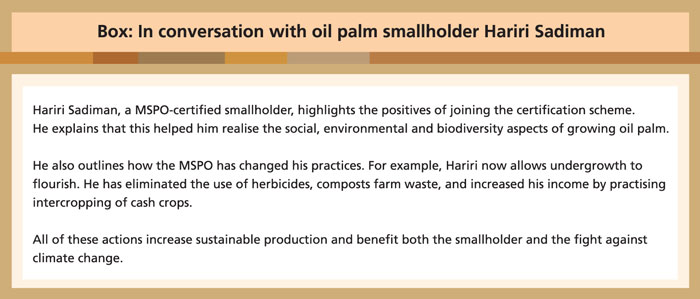
Sustainable innovation consultant and founder of sustainable streetwear brand KinArmat, Mariam Harutyunyan, highlights how the Covid-19 pandemic has inspired consumers to make more environmentally- conscious purchases.
Consumers, in turn, are demanding transparent and traceable supply chains, proving they have increasing power when it comes to effecting policy change. As palm oil is found in almost 50% of packaged products, its role in tackling deforestation and addressing consumer needs is crucial.
Consumers have notoriously condemned palm oil in the past. They have, for instance, criticised the cosmetics industry for its association with palm oil without realising that its substitute – coconut oil – uses five times the amount of land to produce the same quantity of oil.
It is important that consumers recognise that the palm oil industry is making huge progress in regard to deforestation – 98% of oil palm companies have taken at least one measure to reduce forest loss. The MSPO continues to be a leading template of success and ingenuity.
Green trade war?
Muhammed Magassy, member of the CSPO Advisory Board, Gambian Member of Parliament and National Assembly of Gambia and the Parliament for Economic Community of West African States, expresses his belief that the EU’s impending palm oil ban will have far-reaching consequences. The planned boycott may not only reverse progress in sustainability, but also lead to a green trade war with colonialist undertones.
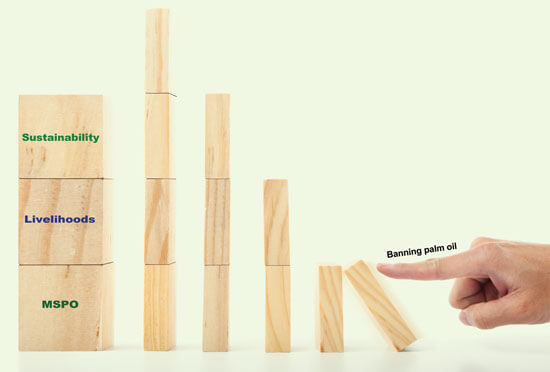
The EU seems to be deciding the rules of global trade without considering the world’s poorest, mainly the millions of smallholders who will be affected by the palm oil ban. Smallholders, who have relied on oil palm cultivation to lift themselves out of poverty, are increasingly worried about being excluded from the EU market, especially in light of Covid-19 which has increased economic insecurity in developing countries. Magassy is concerned that the ban will push smallholders away from sustainable production which involves economic investment.
He also views the ban as more than an example of unfair policy with unintended consequences. The ban verges on protectionism as European oil seeds would be needed to replace palm oil. Rather than punishing emerging economies and protecting domestic production, the EU should aspire to create an even playing field – one which rewards sustainable progress and pursues collaborative frameworks of production and consumption.
However, Glenn Schatz, a member of the CSPO Advisory Board and co-founder of ECORE Ventures, sees the tide turning in EU opinion. Recent reports and opinions released by various arms of the European Parliament are urging MEPs to pursue inclusive partnerships with the Global South in order to prevent deforestation.
The UK’s new Environment Bill will force companies to prove compliance in their supply chains in accordance with local environmental laws and standards. And the Joint Working Group on Palm Oil, established last December, has pledged to increase communication between the EU and ASEAN.
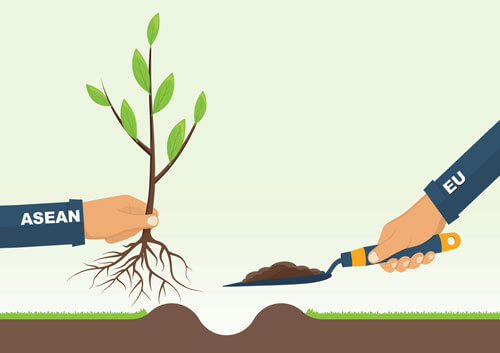
This is promising. While the MSPO continues to progress and transform sustainability practices across Malaysia, the EU’s support will enforce and expand further green policies. An area of potential partnership could be through sharing satellite images which would help Malaysia identify and address areas of concern. If the EU truly cares about the climate, it must consider a trade partnership with ASEAN.
As the sustainability debate ramps up in Europe, with recent conversations around e-fuels and the carbon tax escalating, sharing the realities of sustainable palm oil has never been more important. Through the ‘Sustainability First’ campaign, the CSPO will continue contributing towards this debate and sharing pioneering developments in the industry.
The Centre for Sustainable Palm Oil Studies